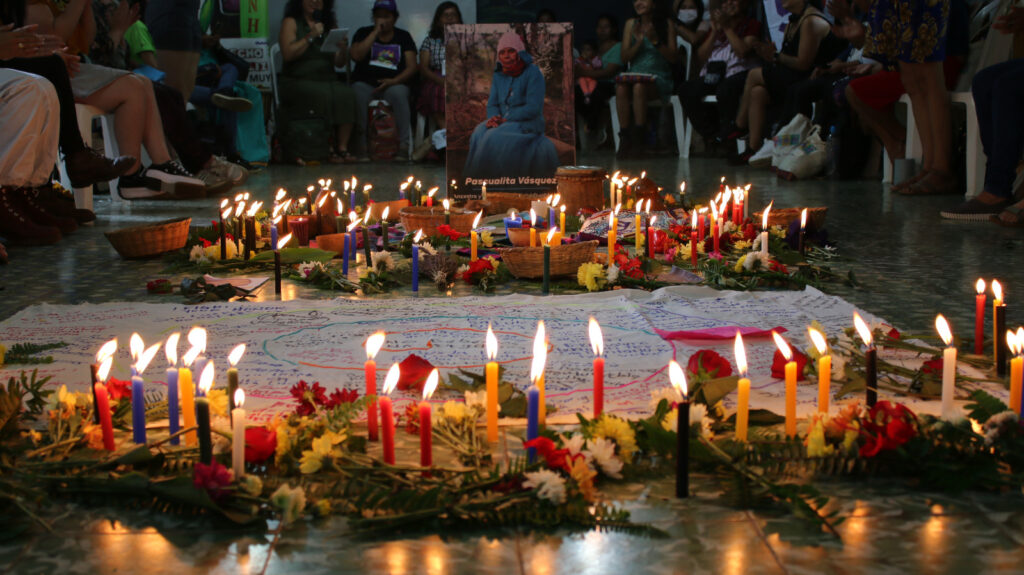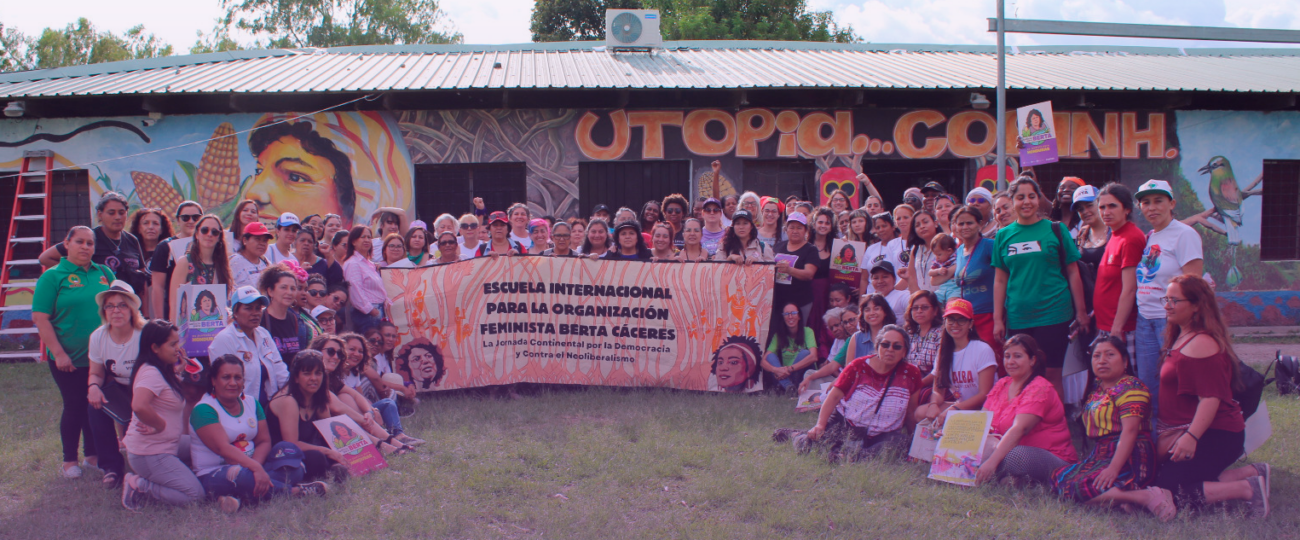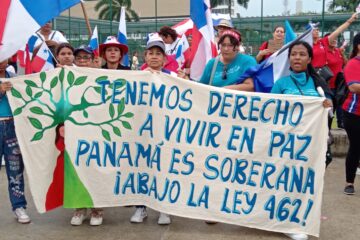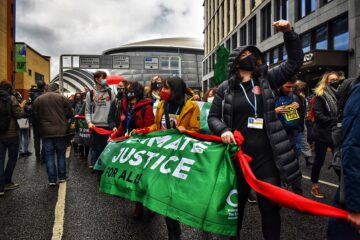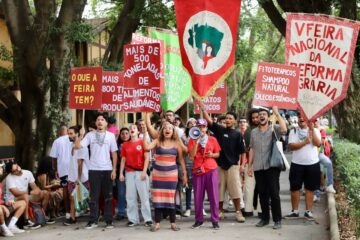Feminist economy. Plural political actors. Systems of oppression. Body, land, state. Feminist identity, theory, and movement. Political proposals of rebelliousness. All these topics were discussed over the course of one week during the on-site edition of the Berta Cáceres International Feminist Organizing School, from August 7th to 11th 2023, in Tegucigalpa, Honduras. More than 100 women attended it, coming from dozens of countries across the Americas and several local, regional, and international organizations, including the World March of Women, Grassroots Global Justice Alliance, Friends of the Earth, Continental Day for Democracy and Against Neoliberalism, ALBA Movements, and La Via Campesina.
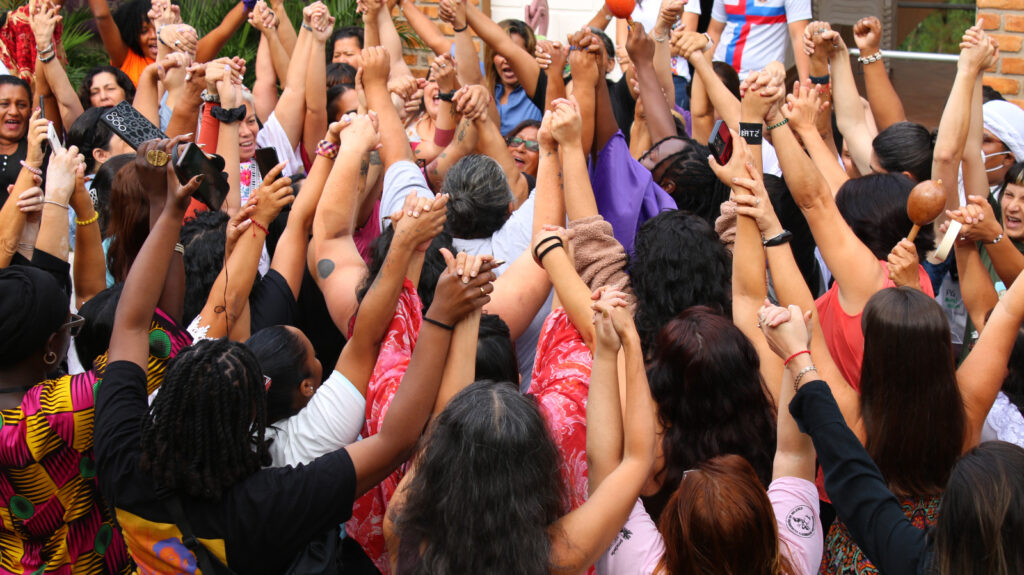
The School Is a Process
The International School was originally planned to be an on-site experience held in Kenya, but it was redesigned to be completely online in 2021 due to the pandemic. Meetings every two weeks were held from April to July, addressing the pillars of the school syllabus, which had been formulated in the previous two years by the social movements involved. Women from all continents, militants of grassroots organizations, took part in the school at the time.
Later, in 2022, the school led to other developments: the School of Facilitators, which is also international, and regional schools, including in the Balkans and the Americas. The School of Facilitators was conceived to multiply training, aiming to provide deeper political and pedagogical understanding about feminist education spaces. In these training processes, women and gender-dissident people find a rich space to exchange information, reflections, knowledge, wisdom, and cultures.
Since the moment the International School first started to be designed and organized, the sisters involved in this process decided to pay tribute to the Honduran leader Berta Cáceres, murdered in 2016. “Berta represents this important political thought that calls us to form alliances, with the comprehensive view she had about colonialism, patriarchy, capitalism, community struggles,” the IFOS coordinator Sandra Morán said in an interview to the radio show Fúria Feminista, produced by Real World Radio and the World March of Women Brazil.
Learning in Movement: Participatory Feminist Methodologies
Feminist education is action. It does not separate body and mind, action and reflection. It also does not separate those who teach from those who learn, as if those who teach had nothing to learn, or as if those who learn had nothing to teach. Knowledge is not simply passed on—it is created, formulated by the group, and every group is unique. Education moments allow participants to look each other in the eye, reflect collectively, face fears, rethink preconceived ideas.
“In my life and my sisters and comrades’ lives, feminism has expanded our views, not only in the political realm, but also in the freedom of our bodies, spirits, the power women and dissidents have, but which have always been rendered invisible.”
Daisy Avedaño (Movement of People Affected by Dams—MAR)
The on-site edition of the School in Honduras provided five intense days where different forms of wisdom-knowledge and experiences met in different formats, including art expressions, yarning circles, different ways of using and occupying the space, and also the interaction between bodies. Participants assessed how important it was to bring back an on-site educational process.
Grassroots feminist education was the methodological strategy across different moments, from discussions to collective debates as a whole group, to smaller group conversations. All organizations contributed with their own accumulated knowledge coming from their resistance and political proposals. One interesting way to move knowledge around, for example, was to build the “historical cord” of movements and organizations right on the first day.
Based on a guiding thread that summarized important milestones throughout the history of feminism and women’s resistance in the Americas, the delegations came together in small groups to further feed this story. The groups looked back on important moments of their own political organizing history in a broader context. It was an important exercise, because it led to an intergenerational discussion about memory.
The histories of resistance are built collectively, as a continuous movement, in which everyone matters.
To make sure the School’s methodological proposals and goals were met, working committees were established to self-organize their tasks: political committee, organizing committee, logistics committee, methodology and facilitation committee, synthesis committee, mística committee, communications committee, order and beauty committee (to assist in moments of fun and organization of the space!), and also the language justice and interpretation team, which provided translation to and from Spanish, English, and Portuguese.
Grassroots feminist education as a political proposal expresses its values in the very practical experience of building the School each day, pointing to feminist economy as a strategy to change the world and its human and nonhuman relationships. This way, women and gender-dissident people materialize the sustainability of life and its transformative, anti-systemic potential. “Feminist economy is grassroots economy because it is collective, because it builds from the commons, from and for everyone’s lives,” Georgina Afonso, a Cuban facilitator of the School, said in an interview. She argues that feminist economy changes us, just like popular education: “It is not just about making statements; on the contrary… It is very hard to build it, because, like popular education states it, you must take a lot from within yourself, even issues that we sometimes don’t consciously admit.”
There is an even greater wish for caring for the space and being creative toward it due to the place chosen to host the School. It took place in the Ecosol Training Center, managed by the COMAL Network, a platform of organizations connected to solidarity economy in Honduras. Being at the Center and being able to experience the space, as well as its different work relationships resulting from grassroots struggles, also provided many lessons. “The School is definitely not a space where you only learn contents—it’s a space where you learn about processes. It is an important, personal, and collective process—and collective not only within each organization, but also in the continental context and alliance,” Sandra Morán added.
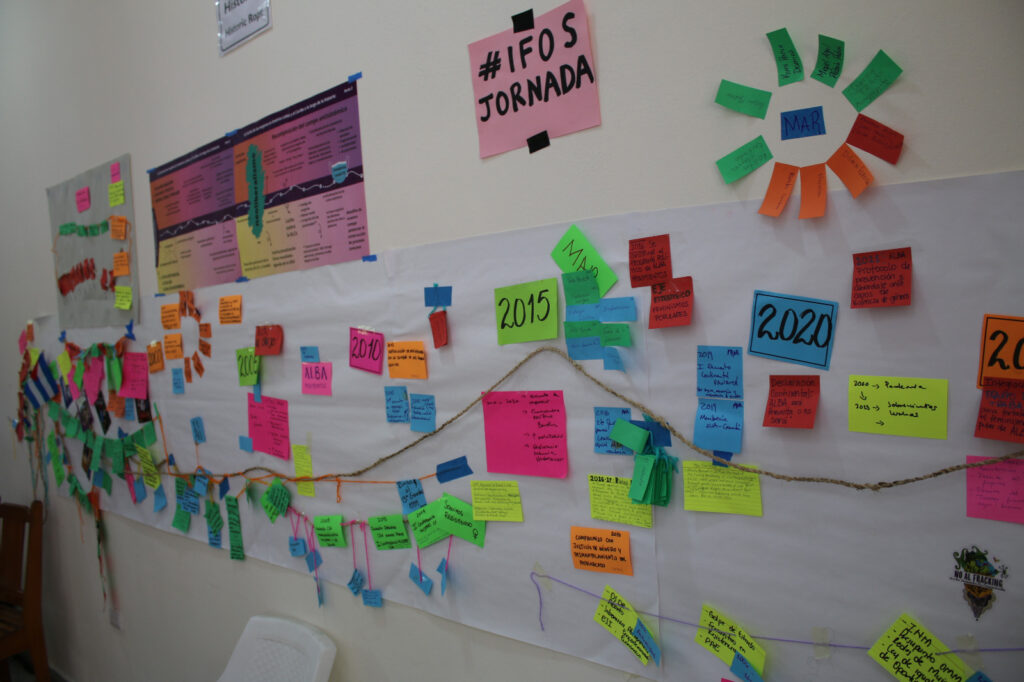
“First Care for the Spiritual, Then the Social”: Berta Cáceres Lives!
On the final day of the School, participants visited the headquarters of the Civic Council of Popular and Indigenous Organizations of Honduras (Consejo Cívico de Organizaciones Populares e Indígenas de Honduras—COPINH) and paid a tribute to the memory of Berta Cáceres.
When participants first got to the COPINH headquarters, they were welcomed by the warm smile and eyes of Bertita, one of Berta Cáceres’ daughter and current coordinator of the organization. Visiting the physical facilities of COPINH shows the materiality and political message of Berta Cáceres. There are numerous murals and colors in reference to her image, along with plants and animals that also live there, making it the living image of Berta.
In a large circle, COPINH women organized a welcome activity that started with a mística where the names of women fighters were mentioned out loud, as a way to connect participants with the works that would be carried out that day, entirely dedicated to the celebration of the memory of struggles.
Next they started a yarning circle to discuss utopias and territories, addressing different struggles waged across the continent. In this space, Bertita once again saluted the IFOS efforts to keep spreading the lessons learned from women’s grassroots struggles, including her mother’s. Then the space was open so that School sisters and comrades could share their struggles based on their realities. Experiences and challenges were shared about resisting against the privatization of territories and common goods in Porto Rico, the Dominican Republic, and Guatemala. They also denounced criminalization, violence, and assassination of leaders in Peru, and the genocide of Black and Indigenous peoples in Brazil. Sisters from Paraguay reflected on the challenges of the present moment, where a new ultra-right-wing government was formed in the country.
This circle was also very moving, with so many accounts by sisters who looked back on striking moments when they met Berta Cáceres. The moment closed with a celebration of the memory of Pascualita Vázquez, a Lenca matriarch and leader, spiritual guide, and great comrade of Berta Cáceres in struggles, who passed away on February 24th, 2022. Pascualita argued that the struggle also happens in the spirit: “First care for the spiritual; then the social.”
Two solemn moments to salute the memory of Berta closed the on-site edition of the School. Participants then visited the cemetery where Berta Cáceres was sowed, and offered her gifts on an altar built on COPINH.
“Berta’s political thought greatly contributed to us, and now we are bringing that back at the School. It seems to me that, as a political exercise for our movements, it is also important to bring back the political thought of our sisters, to learn and continue with them, which means practicing historical memory.” Sandra Morán
It was a special moment to further strengthen the meanings created and reinforced with the school. By celebrating Berta’s legacy, we also celebrate the dreams we continue to pursue. With flowers, candles, songs, words, and silence, sisters and comrades, with their bodies and spirits, collectively shared their yearnings and horizons we fight for—horizons where beings and the peoples no longer have their bodies-territories encroached, and where life blossoms and remains free.
